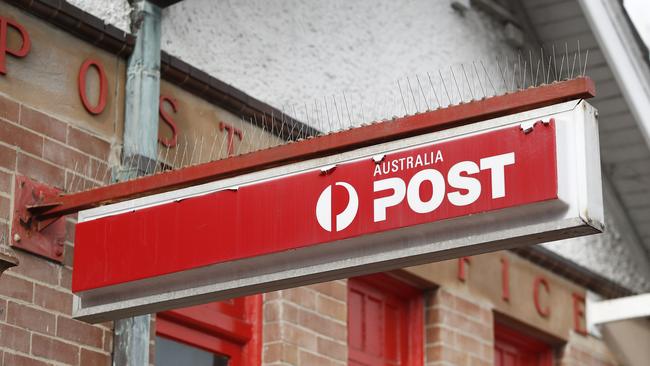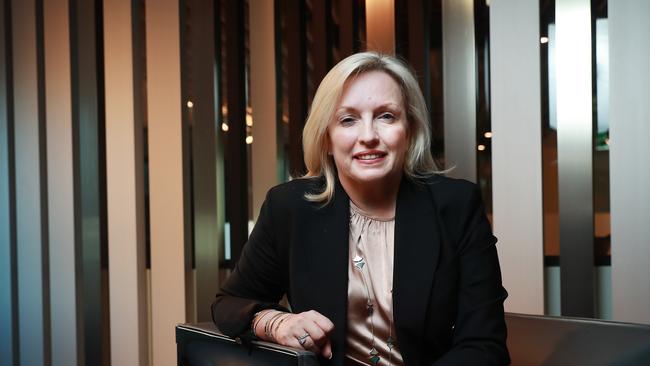Don’t push the envelope with Canberra: Australia Post boss learns a lesson in politics
Exposing a disconnect between how the government and Australia Post’s management view the organisation ignited a political storm.

“I have not used taxpayer’s money. We do not receive government funding. We are a commercial organisation.”
With those words Christine Holgate sealed the beginning of the end of her three-year tenure helming Australia Post.
It wasn’t that her words were incorrect. Technically, they were spot on — but they also exposed a disconnect between how the government and Australia Post’s management view the organisation, and ignited a political storm that made her position untenable.
This week, Ms Holgate resigned with immediate effect. But her departure signals a greater problem for the federal government: what sort of organisation does it want Australia Post to be?
Despite Australia Post having its own special law that requires it to operate as a commercial organisation, one political insider said the group’s government ownership means “it operates with one arm tied behind its back”.
“That stops it running as a fully fledged commercial entity. There is that institutional bias. It’s a government entity and the public view it as a public utility.”
But almost 70 per cent of Australia Post’s operation — its parcels division — is subject to intense commercial competition from Toll, DHL, FedEx and others, with its regulated letters business continuing to shrink each year.
Ms Holgate highlighted this fact when she said she hadn’t used taxpayers’ money, under questioning at Senate estimates about her spending almost $20,000 on gifting four senior executives Cartier watches.

It was that comment that infuriated Prime Minister Scott Morrison. In the government’s eyes, Australia Post is owned by Australians, with the commonwealth custodians of that ownership.
Mr Morrison demanded Ms Holgate stand aside while the government investigated Australia Post expenses, and if “she doesn’t wish to do that, she can go”.
In the past three years, two chief executives have left the 211-year-old organisation after receiving stinging rebukes from prime ministers, despite not breaking any rules for government-owned enterprises. Instead, their crimes have been poor “optics” — and this will be a problem that continues to linger at Australia Post, so long as it remains a government-owned organisation. While Australia Post has fended off competition successfully, controlling more than 80 per cent of Australia’s business-to-consumer parcel delivery market, there is a question among some commentators about why the government owns a business subject to such competition.
Unlike Qantas, Telstra, CBA and CSL (now the biggest company on the ASX if BHP’s London-listed shares are excluded), Australia Post escaped the wave of privatisations that swept through the 1990s.
Back then, Australia Post was predominantly a letters business, which it has a legislated monopoly over. It was not until 2012, under Ahmed Fahour, that it made a $2bn bet on e-commerce and transformed its business. Unlike the US Postal Service, which relies on billions of dollars of taxpayer subsidies each year, Australia Post has remained entirely self-funded, paying the government dividends totalling more than $540m in the past eight years. There is also now precedent for privatising postal services. Britain’s 500-year-old Royal Mail floated on the London Stock Exchange in October 2013. The German government made Deutsche Post a private company earlier, in 1995.
Australia Post has repeatedly said privatisation is a matter for the federal government. But last decade, preliminary plans were drawn up about a partial privatisation, according to people familiar with the matter.
It involved spinning off the unregulated parts of its operations — its parcel business, which is subject to high competition. The plan was that part of the profits would be invested into the post office network, helping manage the gradual decline of the regulated letters business, which would have remained under government ownership.
Valuations of Australia Post’s parcel business vary, but it could be expected to fetch more than $6bn, given Toll this week put a $3.5bn price tag on its Global Express division, which delivers parcels around Australia. And unlike Post — which lifted its profit for the 2020 financial year by 30 per cent to $53.6m — Toll’s Global Express division lost $100m in the June quarter alone in a torrid period of trading including COVID-19 volatility and cyber attacks.
It would have been relatively straightforward for Australia Post to spin off its parcels division. Australia Post and Qantas acquired StarTrack Express for $750m in a 50:50 venture. Post fully acquired the business in 2012 when it bought Qantas’s 50 per cent stake for $408m.
This allowed Australia Post to split its operations into two, with its regulated letters business falling under the red “P” and livery, while most of its parcel business was branded under StarTrack’s blue “P” and livery. But the plan to spin off StarTrack was scrapped quickly, and one of the first actions of Christine Holgate when she joined the organisation in late 2017 was to unite both divisions under the one red Australia Post brand, winning applause from much of the frontline staff.
It’s not that the rationale for privatisation doesn’t stack up. But there has been no political impetus for a privatisation — partial or otherwise.
Apart from backbenchers raising queries from their constituents about delivery delays or postcode code changes, Australia Post doesn’t occupy much mental space among Australia’s political leaders.
“It delivers a profit, it pays a dividend, which helps the budget and is an asset for the government,” said one person familiar with the machinations of Canberra and Australia Post. “No one in government gives Australia Post two seconds’ thought unless it presents a political issue.”
And it is when senior politicians become engulfed in a controversy involving the postal service that their political instincts take over.
Former chief Ahmed Fahour saw that happen when his $5.6m pay packet was revealed at Senate estimates in February 2017. For several years prior, Australia Post had adopted new government business enterprise guidelines, which allowed it to no longer break down executive pay in its annual report, instead disclosing it in a group.
Despite Australia Post following those guidelines, then Prime Minister Malcolm Turnbull criticised Mr Fahour’s pay, saying it was too much and warning of a “cult” of excess among Australian executive remuneration. Mr Fahour resigned soon after.
Ms Holgate found herself coming under similar accusations of excess.
In her case, it wasn’t her pay packet — she earned significantly less than Mr Fahour, with a base salary initially set at $1.375m and potential to double that in bonuses. It was expenses and gifts.
In addition to the Cartier watches, which were given to four executives who secured a deal with three of the big four banks worth $66m a year, Ms Holgate’s office amassed almost $300,000 on its corporate credit card in one year, with hair, make up and private drivers among expenses. Meanwhile The Weekend Australian revealed Australia Post paid $34,500 for Ms Holgate to stay at Melbourne’s Grand Hyatt — just around the corner from its head office — for her first nine months in the job.
The departments of Finance and Communications, supported by Maddocks law firm, are investigating the expenses and findings are expected later this month.
Communications Minister Paul Fletcher declined to comment while the investigation was continuing. But Opposition communications spokeswoman Michelle Rowland told The Weekend Australian that leaders of government-owned enterprises needed to hold themselves to a “higher standard” than private companies.
“It’s important for public companies to be vibrant, competitive and efficient, and it makes sense for remuneration structures to support those objectives. However, the notion that the success of a government business enterprise hinges on adopting the excesses of corporate culture is, in my view, both misguided and missing the point,” Ms Rowland said.
“Working for Australia Post, a cherished institution, is a reward in and of itself. These entities are custodians of taxpayers’ money, and are rightly held to a higher standard than their counterparts in the private sector.
“There is a balance the public expects to be struck, and the board has an important oversight role to play in helping to find that balance.”
But as Australia battles a coronavirus-fuelled recession even listed companies have been put on notice on executive remuneration and bonuses. On Thursday, poultry producer Ingham’s received a “first strike” against its remuneration report, with 50 per cent of shareholders voting against plans to pay a bonus to chief executive Jim Leighton.
It followed Star Entertainment’s first strike at its annual meeting last month, after criticism of its executives being awarded bonuses while the company was receiving JobKeeper payments. Crown Resorts and AMP have also suffered first strikes against remuneration reports this year.
Ms Holgate acknowledged her actions didn’t pass the “pub test for many” and apologised for causing any offence. “Philosophically, I believe if you want to drive positive change, you need to thank and reward positive behaviours,” she said. “However, I deeply regret that a decision made two years ago, which was supported by the chair, to recognise the outstanding work of four employees has caused so much debate and distraction and I appreciate the optics of the gifts involved do not pass the ‘pub test’ for many.”







To join the conversation, please log in. Don't have an account? Register
Join the conversation, you are commenting as Logout